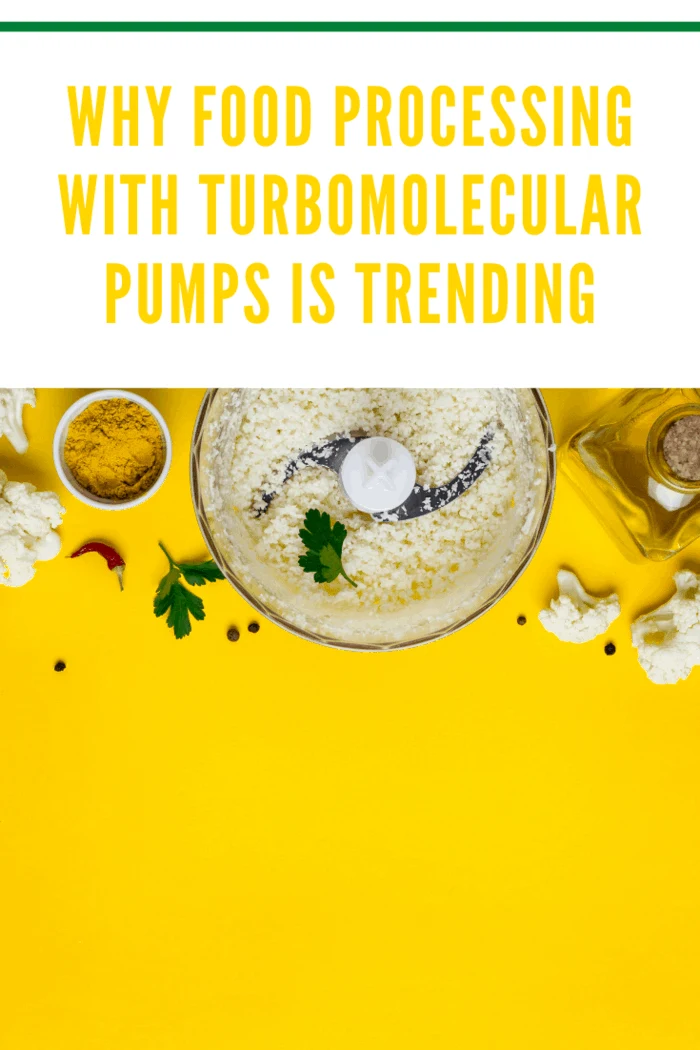The food processing sector is a multi-billion dollar industry that employs thousands of people worldwide. However, it faces an array of challenges that deter its exponential growth. For instance, most food processing companies have trouble sourcing high-quality raw materials. Another huge challenge faced by these companies is the lack of access to advanced technological equipment. Many food processing firms still implement archaic production techniques that are costly and relatively inefficient.
Turbomolecular pumps are quickly becoming popular among food processing companies because of their remarkable efficiency and ease of use. Today, you can easily get affordable turbomolecular vacuum pumps delivered to your exact location.

Here are 5 reasons why food processing with turbomolecular pumps is trending:
They provide a hydrocarbon-free vacuum
The most outstanding benefit provided by turbomolecular pumps is their ability to create a high vacuum. This equipment is basically a special type of vacuum pump that functions as a compressor, injecting energy into gas and driving it out to maintain a hydrocarbon-free vacuum. This function allows turbomolecular pumps to draw numerous applications in the food processing industry. For instance, they conveniently prevent oil and other contaminants from infiltrating the recipient.
They are easy to operate
Most production-based equipments manufactured these days are usually too complicated to control without prior training.
However, anyone can operate a turbomolecular pump without feeling intimidated – they are quite easy to use.
These pumps come in various models based on clients’ specific preferences.
For instance, you can order a turbomolecular pump with stainless steel housing and CF flanges.
These pumps have to function at extremely high speeds.
They offer stable throughput at relatively high pressures
Turbomolecular pumps can operate within a high to ultra-high pressure zone, making them extremely versatile.
This attribute allows them to generate vacuum levels ranging between 10-2 Pa and 10-8 Pa.
Turbomolecular pumps operate using a simple principle: when a fast-rotating solid surface strikes gas molecules, it forces them to flow in one specific direction.
Three distinct pumping mechanisms can be employed to create and maintain a sufficient vacuum: Holweck, Siegbahn, and Gaede.
Each design has its fair share of benefits and drawbacks.
For instance, the Holweck Mechanism provides the highest pumping efficiency, whereas the Siegbahn and Gaede designs are more compact.
They are cost effective
High overhead costs usually cripple many food processing companies.
Naturally, any equipment that can effectively reduce costs and enhance operational efficiency is a welcome delight.
Turbomolecular pumps require minimal maintenance since they are usually connected directly to their respective chambers.
Although these pumps might seem costly during the initial purchase, they provide significant monetary savings in the long run.
In addition, these pumps offer hydrocarbon-free operations and can be used to achieve diverse functions within the processing firm.
They’re a worthwhile investment to have.
They can operate at high temperatures
Most production pumps usually degrade quickly when exposed to relatively high temperatures.
However, turbomolecular pumps are highly adaptable to both hot and cold conditions.
Their versatility makes these pumps vital in heat treatment chambers and isolation vacuums.
In addition, some turbomolecular pumps are specially designed for use in corrosive environments.
Apart from being equipped with smart interlock features, these pumps are constructed using tough, non-corrosive materials that can easily withstand reactive fluids.
This means you can also utilize them in the chemical and textile industries.
Despite their vast assortment of benefits, turbomolecular pumps incorporate several moving parts that can induce vibration and produce electrical noise.
As a result, Helium and other light gases may be pumped at a lower speed.
These pumps could also be contaminated by particulates if not appropriately handled.
However, these few drawbacks rarely occur in the food processing industry – they can effectively be eliminated by regular repair and maintenance of your turbomolecular pumps.
Interestingly, these pumps are also integrated into medical analytical systems because they support low-vibration operations.
Parting shot
Turbomolecular pumps provide high pumping speeds and remarkable stability regardless of the pressure or thermal conditions.
They’re becoming increasingly popular among food processing companies because of their superb efficiency and variability.
Their wide-ranging benefits far outweigh the drawbacks.
Purchasing a turbomolecular pump would be a sage idea if you own a processing firm.
After all, a company that desires success must be willing to adopt cutting-edge technologies and embrace continuous improvement.
